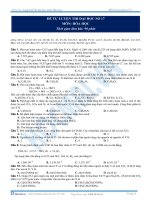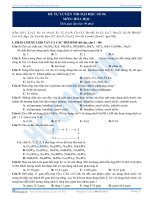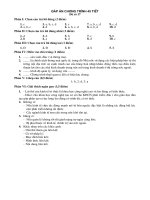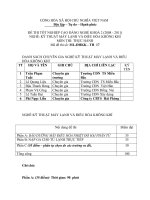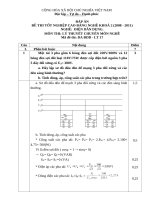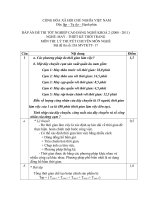PASSAGE 17
Bạn đang xem bản rút gọn của tài liệu. Xem và tải ngay bản đầy đủ của tài liệu tại đây (45.38 KB, 3 trang )
PASSAGE 17
Until recently, most American entrepreneurs were men. Discrimination against women in business, the
demands of caring for families, and lack of business training had kept the number of women
entrepreneurs small. Now, however, businesses owned by women account for more than $40 billion in
annual revenues, and this figure is likely to continue rising throughout the 1990s. As Carolyn Doppelt
Gray, an official of the Small Business Administration, has noted, "The 1970s was the decade of women
entering management, and the 1980s turned out to be the decade of the woman entrepreneur". What are
some of the factors behind this trend? For one thing, as more women earn advanced degrees in business
and enter the corporate world, they are finding obstacles. Women are still excluded from most executive
suites. Charlotte Taylor, a management consultant, had noted, "In the 1970s women believed if they got
an MBA and worked hard they could become chairman of the board. Now they've found out that isn't
going to happen, so they go out on their own".
In the past, most women entrepreneurs worked in "women's" fields: cosmetics and clothing, for example.
But this is changing. Consider ASK Computer Systems, a $22-million-a-year computer software business.
It was founded in 1973 by Sandra Kurtzig, who was then a housewife with degrees in math and
engineering. When Kurtzig founded the business, her first product was software that let weekly
newspapers keep tabs on their newspaper carriers-and her office was a bedroom at home, with a shoebox
under the bed to hold the company's cash. After she succeeded with the newspaper software system, she
hired several bright computer-science graduates to develop additional programs. When these were
marketed and sold, ASK began to grow. It now has 200 employees, and Sandra Kurtzig owns $66.9
million of stock.
Of course, many women who start their own businesses fail, just as men often do. They still face hurdles
in the business world, especially problems in raising money; the banking and finance world is still
dominated by men, and old attitudes die hard. Most businesses owned by women are still quite small. But
the situation is changing; there are likely to be many more Sandra Kurtzigs in the years ahead.
Question 1. What is the main idea of this passage?
A. women today are better educated than in the past, making them more attractive to the business
world.
B. the computer is especially lucrative for women today.
C. women are better at small business than men are.
D. women today are opening more business of their own.
Question 2. The word “excluded” is closest meaning to _________ .
A. not permitted in
B. often invited to
C. decorators of
D. charged admission to
Question 3. All of the following were mentioned in the passage as detriments to women in the business
world EXCEPT _________ .
A. women were required to stay at home with their families.
B. women lacked ability to work in business.
C. women faced discrimination in business.
D. women were not trained in business.
Question 4. The word “that” refers to _________.
A. a woman becomes chairman of the board.
Page 1
B. Women working hard
C. Women achieving advanced degrees
D. Women believing that business is a place for them.
Question 5. According to the passage, Charlotte Taylor believes that women in 1970s _________ .
A. were unrealistic about their opportunities in business management.
B. were still more interested in education than business opportunities
C. had fewer obstacles in business than they do today.
D. were unable to work hard enough to success in business.
Question 6. The author mentions the “ shoesbox under the bed” in order to _________ .
A. show the frugality of women in business
B. show the resourcefulness of Sandra Kurtzig
C. point out that initially the financial resources of Sandra Kurtzig’s business were limited
D. suggest that the company needed to expand
Question 7. The expression “ keep tabs on” is closest meaning to _________ .
A. recognize the appearance of
B. keep records of
C. provide transportation for
D. pay the salaries of
Question 8. The word “hurdles” can be best replaced by __________ .
A. fences
B. obstacles
C. questions
D. small groups
Question 9. It can be inferred from the passage that the author believes that business operated by women
are small because ________ .
A. women prefer a small intimate setting.
B. women can’t deal with money.
C. women are not able to borrow money easily.
D. many women fail at large businesses.
Question 10. The author’s attitude about the future of women in business is ________ .
A. skeptical
B. optimistic
C. frustrated
D. negative
ĐÁP ÁN
1-D
2-A
3-B
4-A
5-C
6-C
7-B
8-B
9-C
10-B
LỜI GIẢI CHI TIẾT
Question 1:
Women today are opening more business of their own = Phụ nữ ngày nay đang mở nhiều doanh nghiệp
của riêng mình hơn
Question 2:
“Women are still excluded from most executive suites” => Phụ nữ vẫn bị loại khỏi những vị trí điều hành
cao nhất
Question 3:
Tất cả những điều dưới đây được đề cập là những thiệt hại, bất lợi đối với phụ nữ trong doanh nghiệp
TRỪ:
+ A. phụ nữ phải ở nhà với gia đình
Page 2
+ B. phụ nữ thiếu khả năng làm việc trong doanh nghiệp
+ C. phụ nữ đối mặt với sự phân biệt trong doanh nghiệp
+ D. phụ nữ không được đào tạo trong doanh nghiệp
“Discrimination against women in business, the demands of caring for families, and lack of business
training had kept the number of women entrepreneurs small.” => Đáp án B sai.
Question 4:
“In the 1970s women believed if they got an MBA and worked hard they could become chairman of the
board. Now they've found out that isn't going to happen, so they go out on their own".” => Trong những
năm 70, phụ nữ tin rằng nếu họ có bằng MBA và làm việc chăm chỉ, họ có thể trở thành chủ tịch hội đồng
quản trị. Nhưng bây giờ họ nhận thấy rằng điều đó – trở thành chủ tịch khơng thể xảy ra.
Question 5:
Were unrealistic about their opportunities in business management
Thông tin ở đoạn sau: “Charlotte Taylor, a management consultant, had noted, "In the 1970s women
believed if they got an MBA and worked hard they could become chairman of the board. Now they've
found out that isn't going to happen, so they go out on their own" (Charlotte Taylor, một nhà cố vấn quản
lý, đã nhận định, “Vào những thập niên 70 những người phụ nữ tin rằng nếu họ có được một tấm bằng
MBA và làm việc chăm chỉ họ có thể trở thành chủ tịch hội đồng quản trị. Giờ đây họ nhận ra rằng điều
đó sẽ khơng xảy ra, nên họ đã tự bung ra ngoài.”)
Question 6:
“her office was a bedroom at home, with a shoebox under the bed to hold the company's cash.” => văn
phòng là phòng ngủ ở nhà với hộp giày là nơi giữ tiền của công ty => ý chỉ là những nguồn lực tài chính
ban đầu của Sandra là rất hạn hẹp
Question 7:
Keep tabs on = keep records in: lưu giữ, ghi lại
Question 8:
Hurdles = obstacles: rào cản, trở ngại
Question 9:
women are not able to borrow money easily
Thông tin ở đoạn sau: “Of course, many women who start their own businesses fail, just as men often do.
They still face hurdles in the business world, especially problems in raising money; the banking and
finance world is still dominated by men, and old attitudes die hard.” (Tất nhiên, nhiều phụ nữ khởi đầu
doanh nghiệp riêng của mình cũng chịu thất bại như nhữn người đàn ông. Họ vẫn gặp phải những trở ngại
trong giới kinh doanh, đặc biệt là vấn đề huy động tiền bạc, giới tài chính ngân hàng vẫn ưu tiên nam giới
và những thái độ xưa cũ thì khó mà mất đi được.)
Question 10:
optimistic = lạc quan
Page 3

